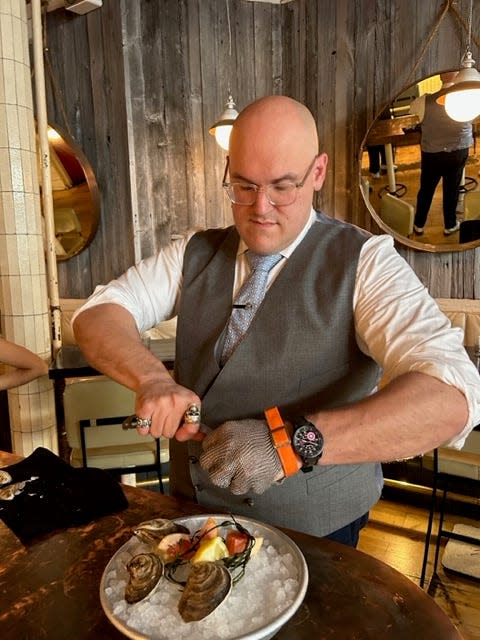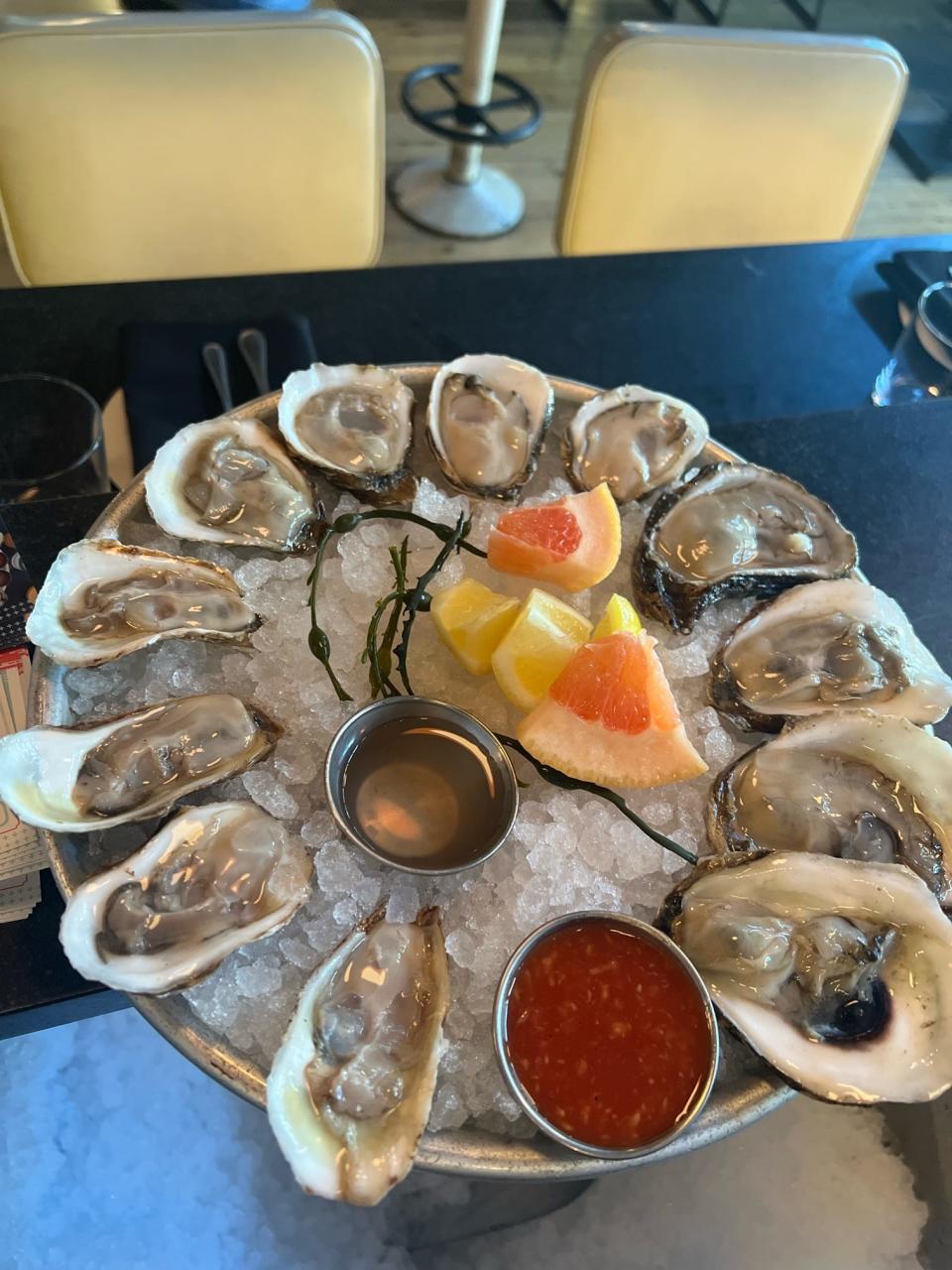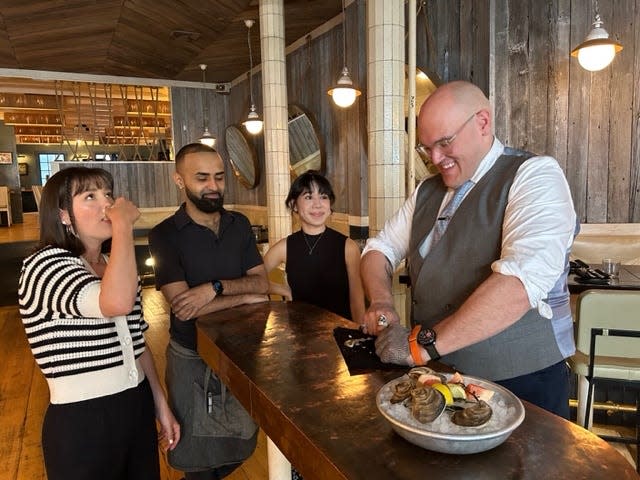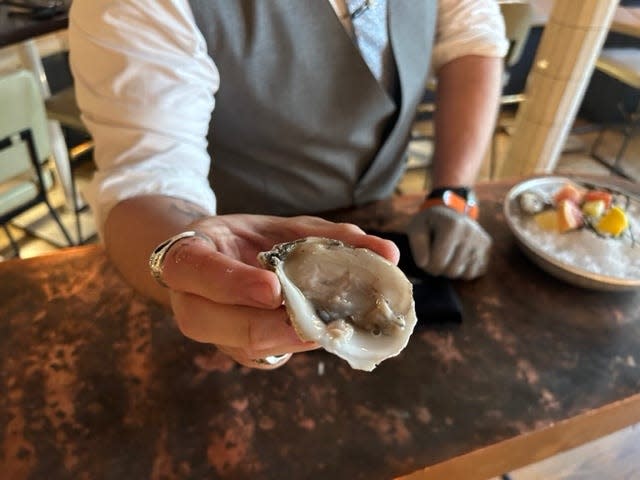What's a mermmelier? Think sommelier, but instead of wine, it's all about oysters
NEW YORK − Most of us probably have had encounters with a sommelier.
That’s the person who sidles up to your table at a fancy restaurant and tells you about the various choice wines you might pair with your meal. Sommeliers usually boast credentials to prove their oenophile chops.
Well, get ready for the newest food expert: Your friendly local mermmelier. What's that? Hint: “Mer” is French for ocean.
A mermmelier is an expert on oysters. That’s right, those slimy, briny, shell-encased delicacies from the sea. And Jeremy Benson, general manager at New York’s Crave Fishbar, is, on track to become one of the first such certified experts in the world.
“For me, tasting an oyster is like tasting the sea, which takes me back to my childhood swimming in the Atlantic,” says Benson, 37, a Massachusetts native who is helping pilot a certification organized by the Oyster Master Guild, a group dedicated to elevating the oyster’s status. “I just want to share that magic with others.”

To achieve his goal, Benson turned to Patrick McMurray and Julie Qiu, both of whom are oyster-obsessed. They created the Oyster Master Guild as a forum for educating and certifying those passionate about this oceanic delicacy.
Benson is their first Oyster Master Guild certification-course enrollee. He's part of a small group of aspiring masters, both enthusiasts and restaurateurs, for an inaugural and largely virtual seminar aimed at helping them enlightening the masses.
“Sometimes you’ll get customers saying, 'An oyster is an oyster, why should I pay different prices for different ones?'” says McMurray. “Well, as with wines, there are different notes. Maybe you’ll taste salt and melon and cucumber. You taste its origins as you would a wine's roots.”
We shuck 'em, you suck 'em: A slogan every master oyster sommelier loves
Oysters help clean the oceans, filtering gallons of water every day
McMurray is a Canadian restaurateur and author, as well as the current Guinness World Record holder for the most oysters shucked in one minute. That would be 39. Don't try that at home.
Qiu (pronounced "chew") founded the In a Half Shell blog dedicated to oyster appreciation. Its homepage encourages visitors to be "bivalve curious," and provides a wealth of information on oyster producers, purveyors and destinations.
“For me, it all started when I was 15 and I tasted oysters while visiting an uncle in San Diego,” says Qiu. As her passion for oysters grew into an obsession, she quickly understood that all oysters are not alike.
“I found myself one day at an oyster farm in the middle of the Long Island Sound, and when I tasted that oyster, it had a flavor totally unique to that location,” she says. “That was the moment when I realized, wow, this is an amazing product.”

Qiu and McMurray do love eating oysters, but they’re equally keen to spread the word about the green nature of this food source. Oysters, they point out, are not only a renewable and sustainable protein but also act as natural water purifiers. One adult oyster can filter gallons of water a day.
Better still, they're harvestable. Given that a sizable percentage of the world's natural oysters have disappeared as a result of overfishing, disease and warming oceans, oyster farms have stepped in.
Fertilized oyster larvae attach to old oyster shells and grow their own new shells over a few years, allowing for the development of massive oyster farms that can be as lucrative as they are delicious. A five-cent oyster seed can turn into a 60-cent oyster that restaurateurs will sell to customers for around $3, or $1.50 at happy hour.
Do pearls come from clams? Where these organic gemstones can be found.
Oysters, like fine wine, get their individual taste from the environment
“Oyster appreciation has been growing for some time,” says Qiu. “When I first joined the New York Oyster Lovers meet-up years ago, there were many hundred of us, and now there are more than 1,000. We just want people to know what they’re eating and why.”
She and McMurray are both supporters of the Billion Oyster Project, a nonprofit aimed at cleaning up New York's waterways by creating oyster reefs that also attract sea life and protect against strong seas. New sightings of whales and other creatures have been reported since the project got underway.
“Oysters are nutritious and good for the planet, too, but when you say that, some people won’t want them anymore,” McMurray says with a laugh. “Better to just focus on how delectable they are."

Where wines often get their bouquet and taste from the soil and other natural elements in the vineyards, oysters carry with them the taste of the oceans in which they live.
Broadly speaking, Benson says, East Coast oysters are brinier and saltier, with a meat that is delicate. West Coast oysters dial back the salt and have a chewier texture.
On Crave’s menu are Atlantic offerings that often include Blue Points (Long Island Sound, Connecticut) and Black Duck Salt (Hog Island Bay, Virginia). From the Pacific, Pebble Beach (Hood Canal, Washington) and Kusshi (Deep Bay, British Columbia).
Surprise! A Pennsylvania man found a purple pearl in a restaurant clam. It's worth thousands
Master oyster tip: Ditch those sauces for a hit of lemon or grapefruit
Benson is a spirited oyster booster. Donning a chain-mail glove, he deftly shucks a few Blue Point oysters for a visitor before squeezing just a touch of lemon, and sometimes grapefruit, on top.
While many eateries offer a range of sauce toppings for oysters, Benson and other purists see this as taboo – a bit like diluting a fine wine with water. “You want to taste everything about that oyster, including the water it lived in,” he says.
As the guinea pig for the master certification program, Benson is helping McMurray and Qiu fine-tune the course as he goes. The first level of proficiency is called Oyster Appreciation Fundamentals, and covers everything from learning about different oyster varieties to how to shuck without injuring yourself.
Not all carbs are the same. Everything you need to know about complex carbohydrates.

Eventually, the course will include other levels: Level 2 will concentrate on the art of oyster pairings, Level 3 on how to create a varied oyster program for diners, and Level 4 will school eatery owners on oyster menu success.
But for Benson, becoming one of the world’s first certified oyster mermmeliers is simply about making customers feel like they’re about to be transported on an oceanic journey through food.
“I wanted to be able to walk to a table and say, in the same way a master sommelier can, here is proof of my expertise,” he says. “You don't want a doctor operating on you without a degree and I personally believe that, while I have worked hard to build my own knowledge, being an Oyster Master will be something that proves I can talk the talk.”
Is honey good for you? Learn about the buzz here
This article originally appeared on USA TODAY: Wine has sommeliers. Oyster fans, get ready to meet your mermmelier

